Organizational Behaviour at BBC: A Comprehensive Case Analysis
VerifiedAdded on 2023/06/04
|39
|8564
|158
Case Study
AI Summary
This case study provides a detailed analysis of organizational behaviour within the British Broadcasting Corporation (BBC). It explores the influence of culture, power, and politics on employee behaviour, referencing relevant theories such as Hofstede's cultural dimensions and Handy's typology to assess the BBC's organizational culture. The study investigates motivation strategies, applying theories to the BBC context, and examines different team types and management approaches within the organization. Furthermore, it evaluates team performance, suggests improvements using the Path-Goal theory, and identifies communication barriers that hinder effective organizational operations. The analysis considers the BBC's past and potential future organizational attributes, offering insights into how the company can adapt to challenges and foster a more productive and innovative work environment. Desklib offers a wide range of solved assignments and past papers for students seeking academic assistance.
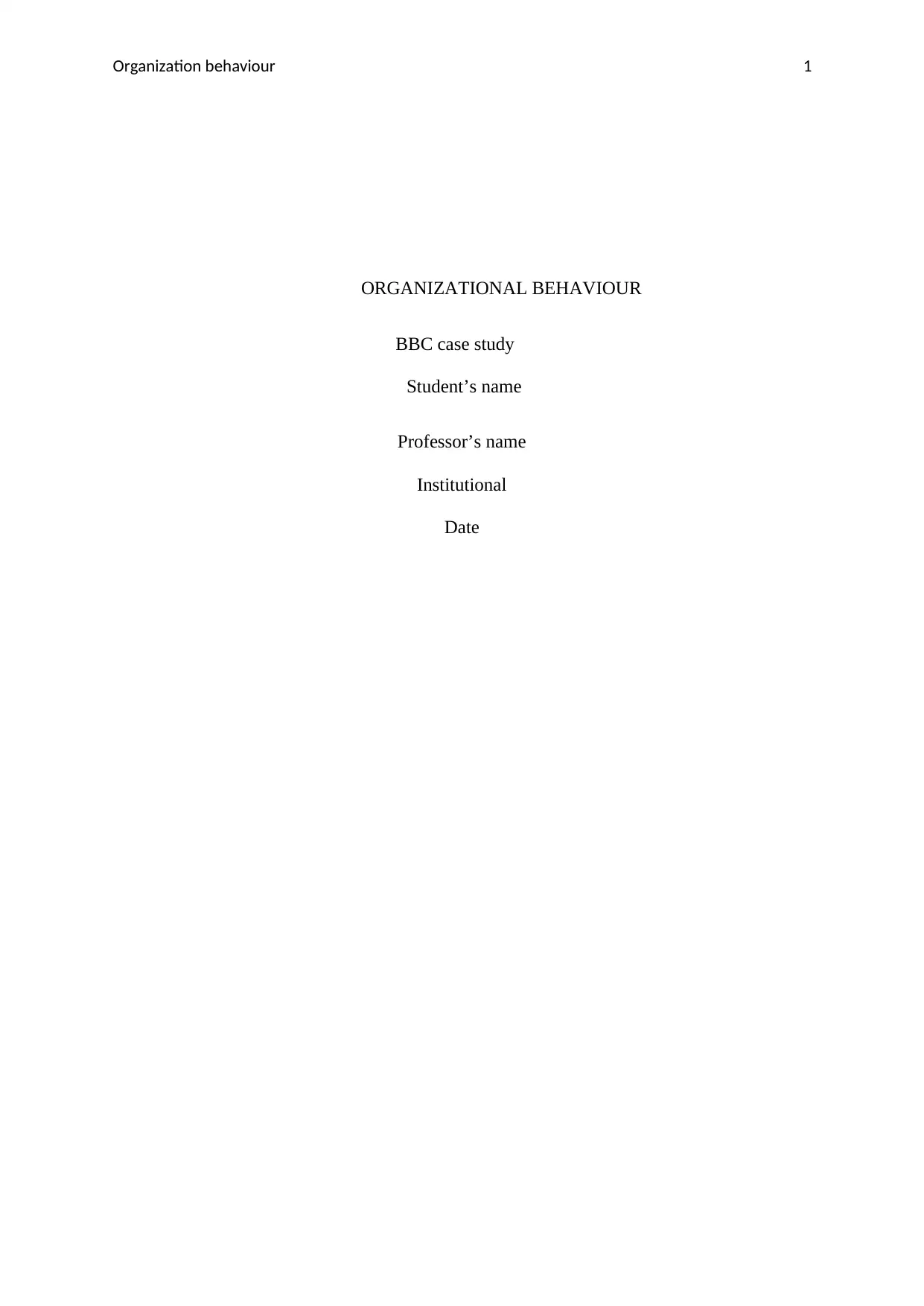
Organization behaviour 1
ORGANIZATIONAL BEHAVIOUR
BBC case study
Student’s name
Professor’s name
Institutional
Date
ORGANIZATIONAL BEHAVIOUR
BBC case study
Student’s name
Professor’s name
Institutional
Date
Paraphrase This Document
Need a fresh take? Get an instant paraphrase of this document with our AI Paraphraser
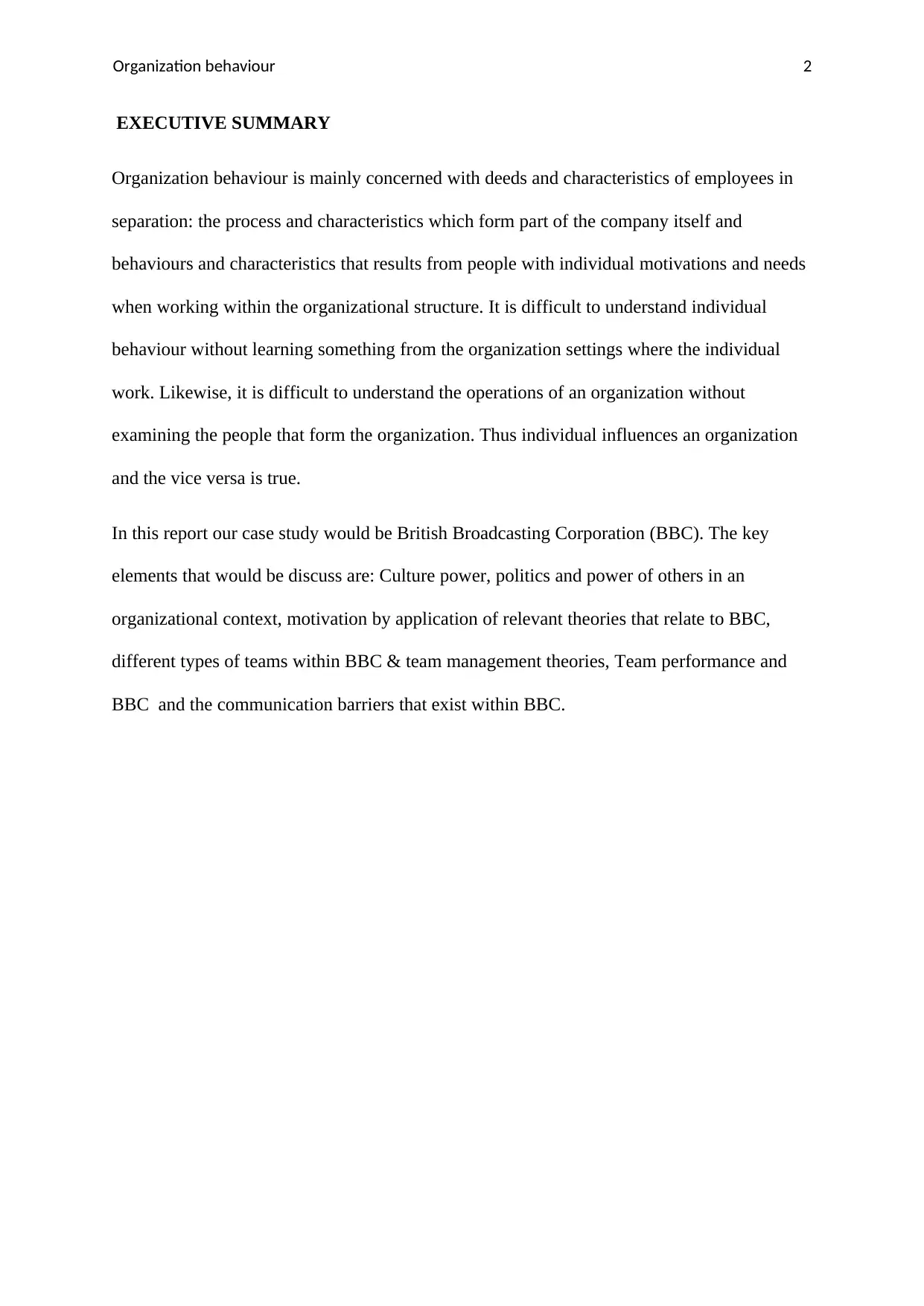
Organization behaviour 2
EXECUTIVE SUMMARY
Organization behaviour is mainly concerned with deeds and characteristics of employees in
separation: the process and characteristics which form part of the company itself and
behaviours and characteristics that results from people with individual motivations and needs
when working within the organizational structure. It is difficult to understand individual
behaviour without learning something from the organization settings where the individual
work. Likewise, it is difficult to understand the operations of an organization without
examining the people that form the organization. Thus individual influences an organization
and the vice versa is true.
In this report our case study would be British Broadcasting Corporation (BBC). The key
elements that would be discuss are: Culture power, politics and power of others in an
organizational context, motivation by application of relevant theories that relate to BBC,
different types of teams within BBC & team management theories, Team performance and
BBC and the communication barriers that exist within BBC.
EXECUTIVE SUMMARY
Organization behaviour is mainly concerned with deeds and characteristics of employees in
separation: the process and characteristics which form part of the company itself and
behaviours and characteristics that results from people with individual motivations and needs
when working within the organizational structure. It is difficult to understand individual
behaviour without learning something from the organization settings where the individual
work. Likewise, it is difficult to understand the operations of an organization without
examining the people that form the organization. Thus individual influences an organization
and the vice versa is true.
In this report our case study would be British Broadcasting Corporation (BBC). The key
elements that would be discuss are: Culture power, politics and power of others in an
organizational context, motivation by application of relevant theories that relate to BBC,
different types of teams within BBC & team management theories, Team performance and
BBC and the communication barriers that exist within BBC.
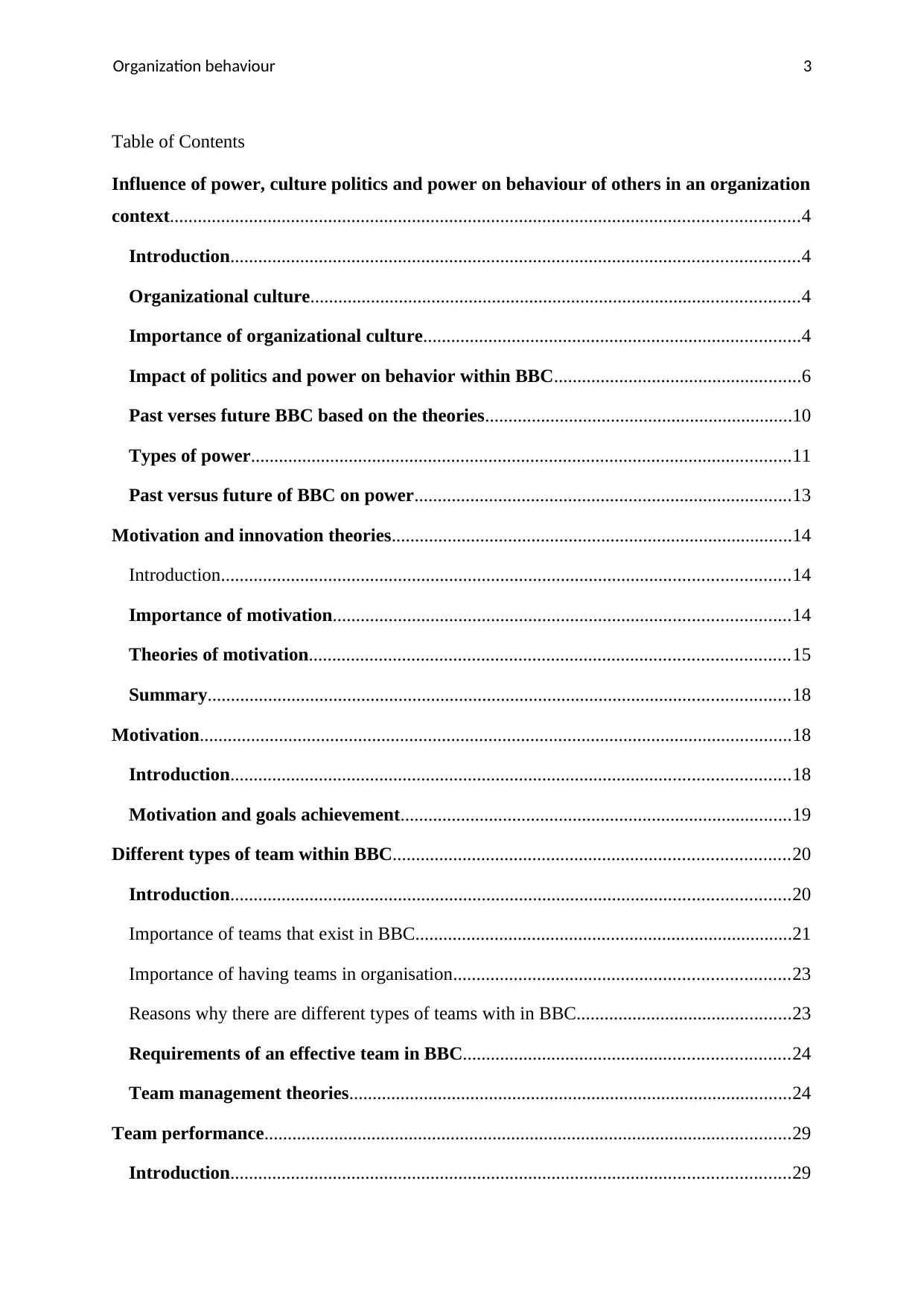
Organization behaviour 3
Table of Contents
Influence of power, culture politics and power on behaviour of others in an organization
context.......................................................................................................................................4
Introduction..........................................................................................................................4
Organizational culture.........................................................................................................4
Importance of organizational culture.................................................................................4
Impact of politics and power on behavior within BBC.....................................................6
Past verses future BBC based on the theories..................................................................10
Types of power....................................................................................................................11
Past versus future of BBC on power.................................................................................13
Motivation and innovation theories......................................................................................14
Introduction..........................................................................................................................14
Importance of motivation..................................................................................................14
Theories of motivation.......................................................................................................15
Summary.............................................................................................................................18
Motivation...............................................................................................................................18
Introduction........................................................................................................................18
Motivation and goals achievement....................................................................................19
Different types of team within BBC.....................................................................................20
Introduction........................................................................................................................20
Importance of teams that exist in BBC.................................................................................21
Importance of having teams in organisation........................................................................23
Reasons why there are different types of teams with in BBC..............................................23
Requirements of an effective team in BBC......................................................................24
Team management theories...............................................................................................24
Team performance.................................................................................................................29
Introduction........................................................................................................................29
Table of Contents
Influence of power, culture politics and power on behaviour of others in an organization
context.......................................................................................................................................4
Introduction..........................................................................................................................4
Organizational culture.........................................................................................................4
Importance of organizational culture.................................................................................4
Impact of politics and power on behavior within BBC.....................................................6
Past verses future BBC based on the theories..................................................................10
Types of power....................................................................................................................11
Past versus future of BBC on power.................................................................................13
Motivation and innovation theories......................................................................................14
Introduction..........................................................................................................................14
Importance of motivation..................................................................................................14
Theories of motivation.......................................................................................................15
Summary.............................................................................................................................18
Motivation...............................................................................................................................18
Introduction........................................................................................................................18
Motivation and goals achievement....................................................................................19
Different types of team within BBC.....................................................................................20
Introduction........................................................................................................................20
Importance of teams that exist in BBC.................................................................................21
Importance of having teams in organisation........................................................................23
Reasons why there are different types of teams with in BBC..............................................23
Requirements of an effective team in BBC......................................................................24
Team management theories...............................................................................................24
Team performance.................................................................................................................29
Introduction........................................................................................................................29
⊘ This is a preview!⊘
Do you want full access?
Subscribe today to unlock all pages.

Trusted by 1+ million students worldwide
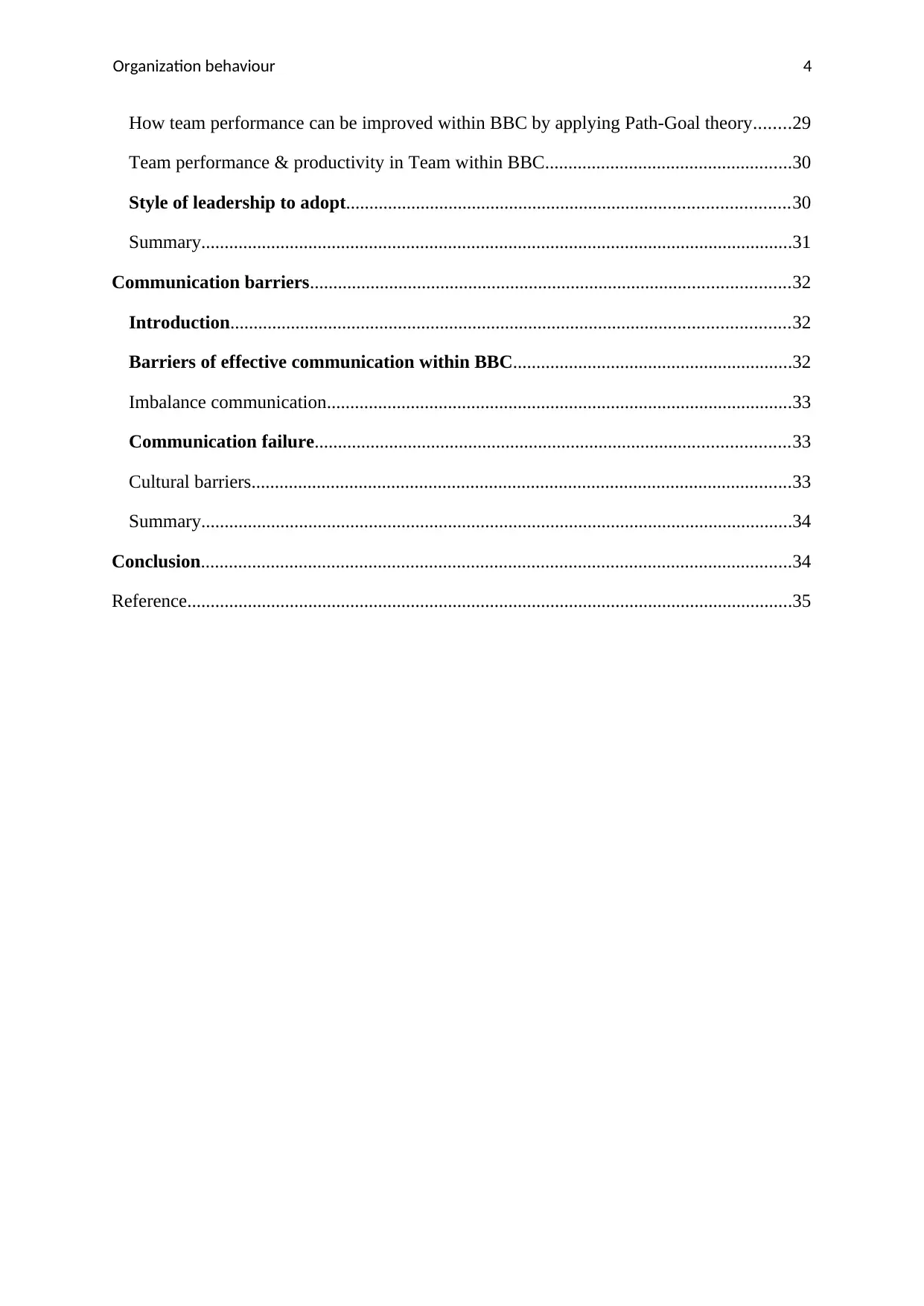
Organization behaviour 4
How team performance can be improved within BBC by applying Path-Goal theory........29
Team performance & productivity in Team within BBC.....................................................30
Style of leadership to adopt...............................................................................................30
Summary...............................................................................................................................31
Communication barriers.......................................................................................................32
Introduction........................................................................................................................32
Barriers of effective communication within BBC............................................................32
Imbalance communication....................................................................................................33
Communication failure......................................................................................................33
Cultural barriers....................................................................................................................33
Summary...............................................................................................................................34
Conclusion...............................................................................................................................34
Reference..................................................................................................................................35
How team performance can be improved within BBC by applying Path-Goal theory........29
Team performance & productivity in Team within BBC.....................................................30
Style of leadership to adopt...............................................................................................30
Summary...............................................................................................................................31
Communication barriers.......................................................................................................32
Introduction........................................................................................................................32
Barriers of effective communication within BBC............................................................32
Imbalance communication....................................................................................................33
Communication failure......................................................................................................33
Cultural barriers....................................................................................................................33
Summary...............................................................................................................................34
Conclusion...............................................................................................................................34
Reference..................................................................................................................................35
Paraphrase This Document
Need a fresh take? Get an instant paraphrase of this document with our AI Paraphraser
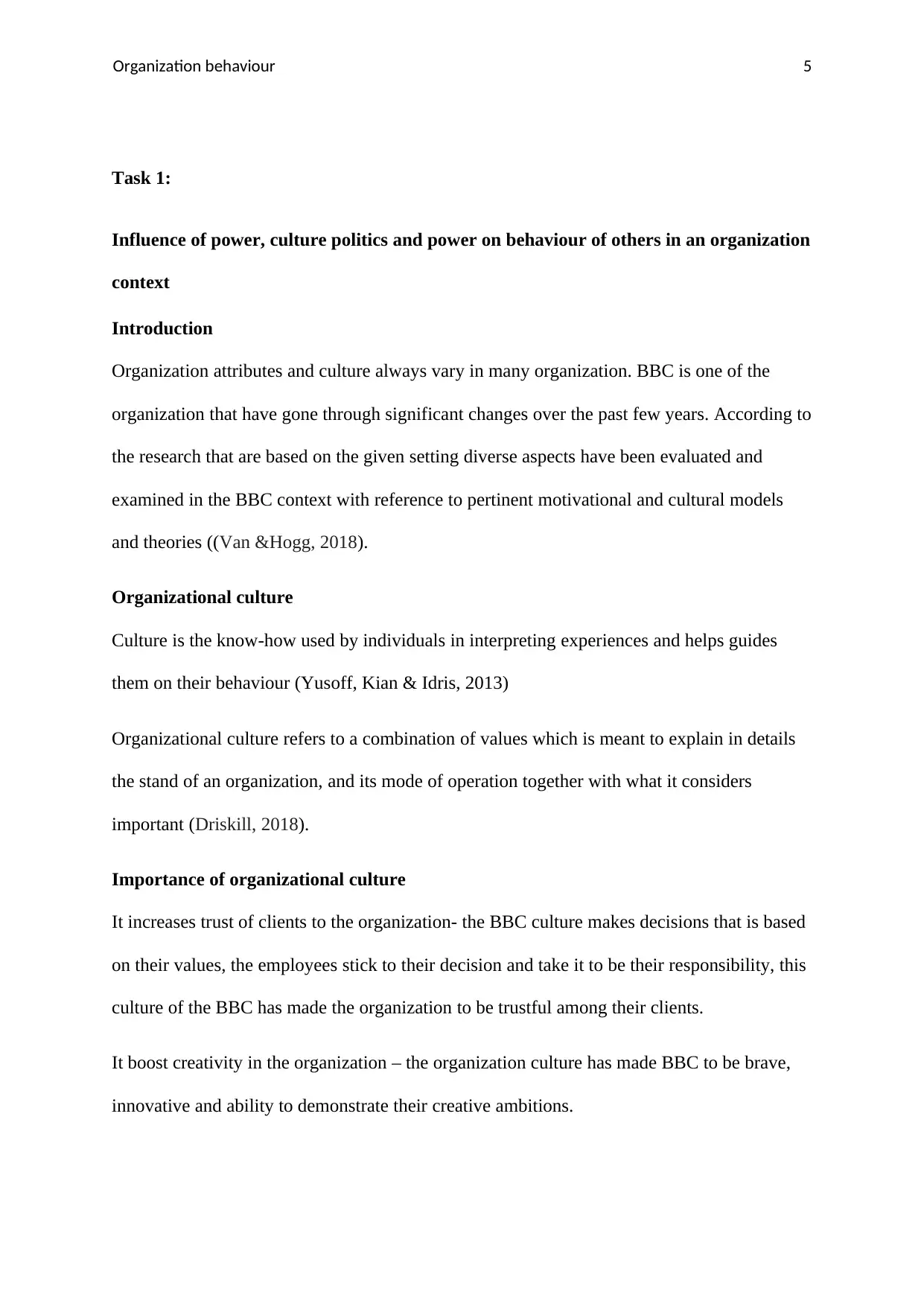
Organization behaviour 5
Task 1:
Influence of power, culture politics and power on behaviour of others in an organization
context
Introduction
Organization attributes and culture always vary in many organization. BBC is one of the
organization that have gone through significant changes over the past few years. According to
the research that are based on the given setting diverse aspects have been evaluated and
examined in the BBC context with reference to pertinent motivational and cultural models
and theories ((Van &Hogg, 2018).
Organizational culture
Culture is the know-how used by individuals in interpreting experiences and helps guides
them on their behaviour (Yusoff, Kian & Idris, 2013)
Organizational culture refers to a combination of values which is meant to explain in details
the stand of an organization, and its mode of operation together with what it considers
important (Driskill, 2018).
Importance of organizational culture
It increases trust of clients to the organization- the BBC culture makes decisions that is based
on their values, the employees stick to their decision and take it to be their responsibility, this
culture of the BBC has made the organization to be trustful among their clients.
It boost creativity in the organization – the organization culture has made BBC to be brave,
innovative and ability to demonstrate their creative ambitions.
Task 1:
Influence of power, culture politics and power on behaviour of others in an organization
context
Introduction
Organization attributes and culture always vary in many organization. BBC is one of the
organization that have gone through significant changes over the past few years. According to
the research that are based on the given setting diverse aspects have been evaluated and
examined in the BBC context with reference to pertinent motivational and cultural models
and theories ((Van &Hogg, 2018).
Organizational culture
Culture is the know-how used by individuals in interpreting experiences and helps guides
them on their behaviour (Yusoff, Kian & Idris, 2013)
Organizational culture refers to a combination of values which is meant to explain in details
the stand of an organization, and its mode of operation together with what it considers
important (Driskill, 2018).
Importance of organizational culture
It increases trust of clients to the organization- the BBC culture makes decisions that is based
on their values, the employees stick to their decision and take it to be their responsibility, this
culture of the BBC has made the organization to be trustful among their clients.
It boost creativity in the organization – the organization culture has made BBC to be brave,
innovative and ability to demonstrate their creative ambitions.
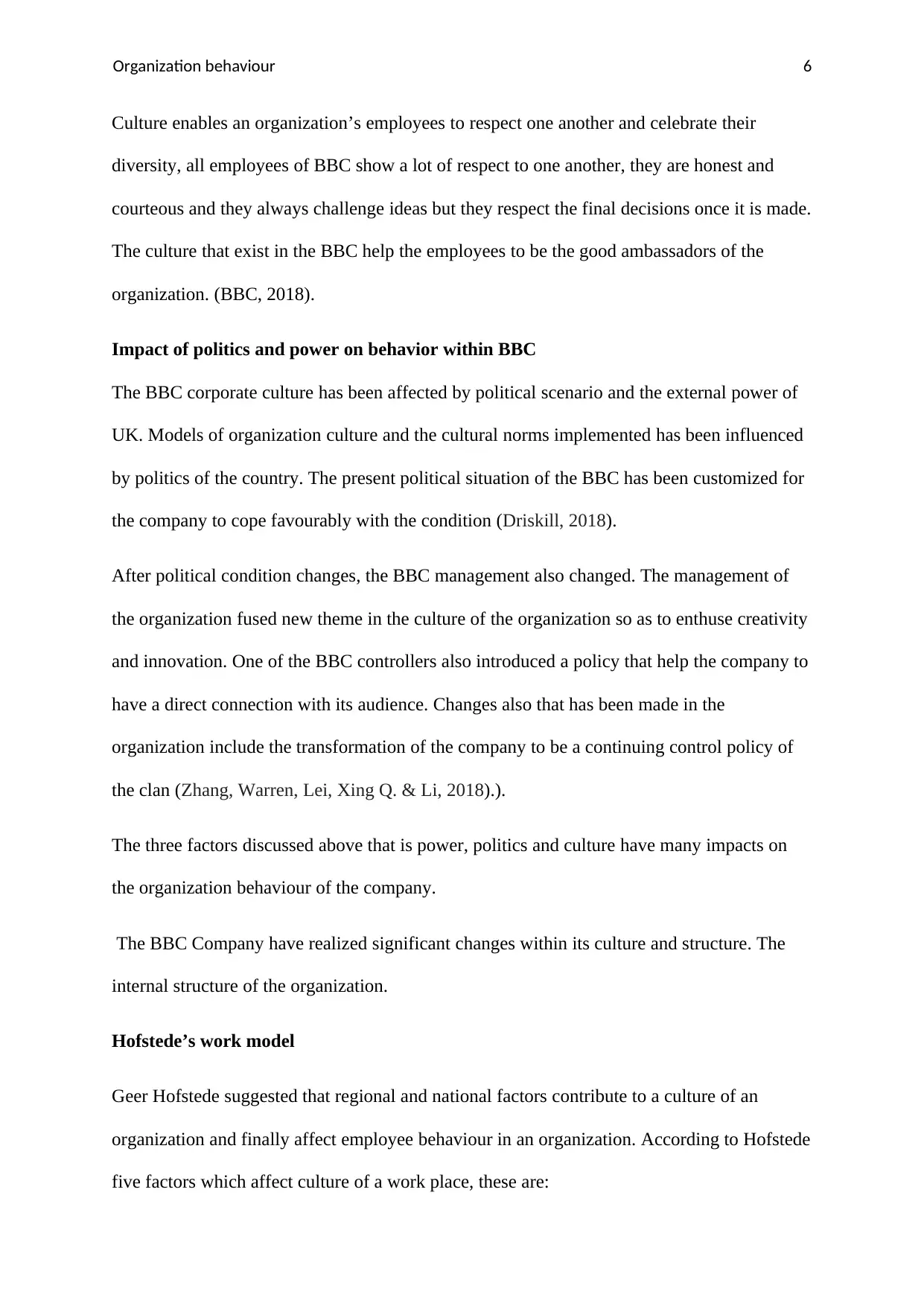
Organization behaviour 6
Culture enables an organization’s employees to respect one another and celebrate their
diversity, all employees of BBC show a lot of respect to one another, they are honest and
courteous and they always challenge ideas but they respect the final decisions once it is made.
The culture that exist in the BBC help the employees to be the good ambassadors of the
organization. (BBC, 2018).
Impact of politics and power on behavior within BBC
The BBC corporate culture has been affected by political scenario and the external power of
UK. Models of organization culture and the cultural norms implemented has been influenced
by politics of the country. The present political situation of the BBC has been customized for
the company to cope favourably with the condition (Driskill, 2018).
After political condition changes, the BBC management also changed. The management of
the organization fused new theme in the culture of the organization so as to enthuse creativity
and innovation. One of the BBC controllers also introduced a policy that help the company to
have a direct connection with its audience. Changes also that has been made in the
organization include the transformation of the company to be a continuing control policy of
the clan (Zhang, Warren, Lei, Xing Q. & Li, 2018).).
The three factors discussed above that is power, politics and culture have many impacts on
the organization behaviour of the company.
The BBC Company have realized significant changes within its culture and structure. The
internal structure of the organization.
Hofstede’s work model
Geer Hofstede suggested that regional and national factors contribute to a culture of an
organization and finally affect employee behaviour in an organization. According to Hofstede
five factors which affect culture of a work place, these are:
Culture enables an organization’s employees to respect one another and celebrate their
diversity, all employees of BBC show a lot of respect to one another, they are honest and
courteous and they always challenge ideas but they respect the final decisions once it is made.
The culture that exist in the BBC help the employees to be the good ambassadors of the
organization. (BBC, 2018).
Impact of politics and power on behavior within BBC
The BBC corporate culture has been affected by political scenario and the external power of
UK. Models of organization culture and the cultural norms implemented has been influenced
by politics of the country. The present political situation of the BBC has been customized for
the company to cope favourably with the condition (Driskill, 2018).
After political condition changes, the BBC management also changed. The management of
the organization fused new theme in the culture of the organization so as to enthuse creativity
and innovation. One of the BBC controllers also introduced a policy that help the company to
have a direct connection with its audience. Changes also that has been made in the
organization include the transformation of the company to be a continuing control policy of
the clan (Zhang, Warren, Lei, Xing Q. & Li, 2018).).
The three factors discussed above that is power, politics and culture have many impacts on
the organization behaviour of the company.
The BBC Company have realized significant changes within its culture and structure. The
internal structure of the organization.
Hofstede’s work model
Geer Hofstede suggested that regional and national factors contribute to a culture of an
organization and finally affect employee behaviour in an organization. According to Hofstede
five factors which affect culture of a work place, these are:
⊘ This is a preview!⊘
Do you want full access?
Subscribe today to unlock all pages.

Trusted by 1+ million students worldwide
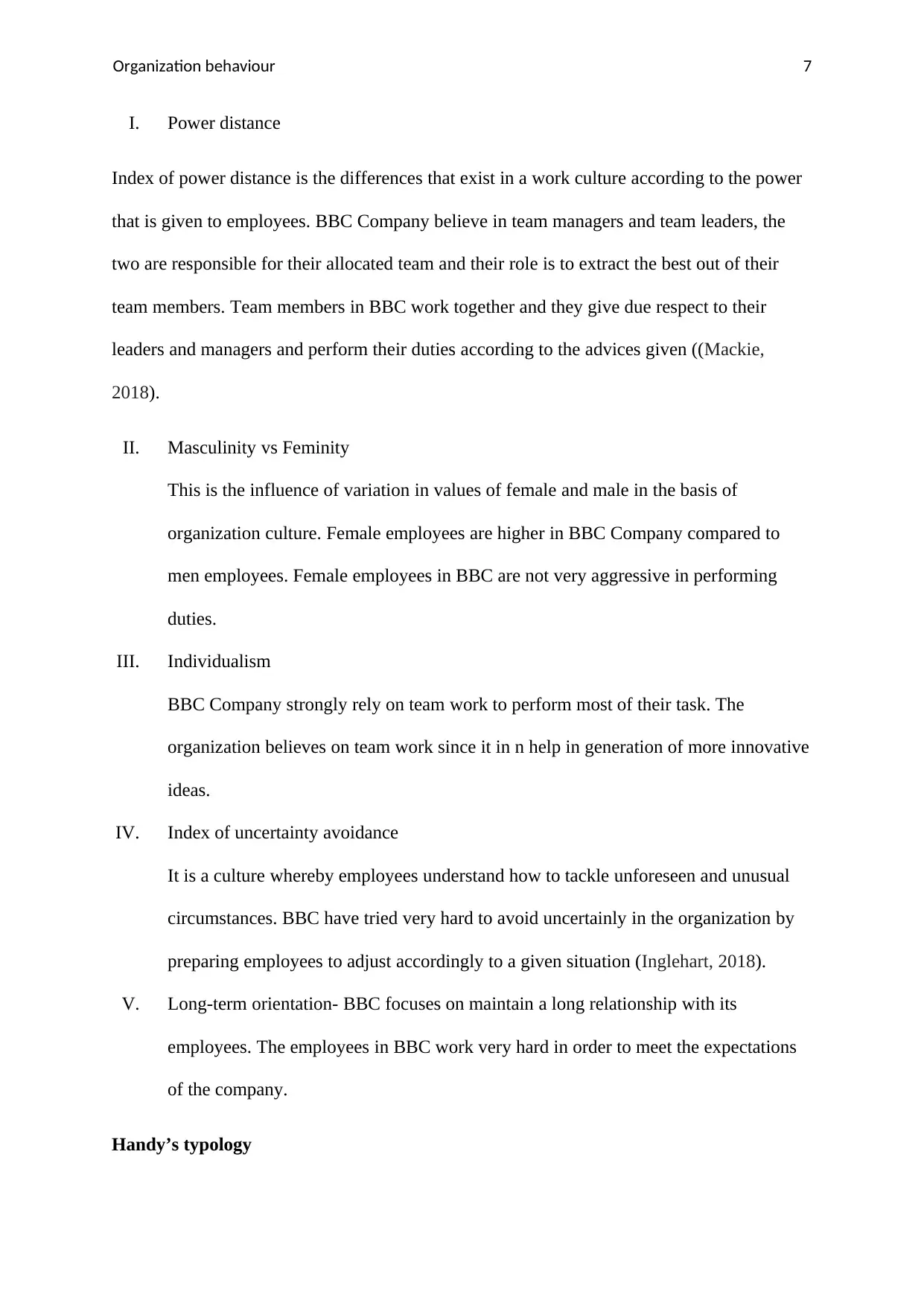
Organization behaviour 7
I. Power distance
Index of power distance is the differences that exist in a work culture according to the power
that is given to employees. BBC Company believe in team managers and team leaders, the
two are responsible for their allocated team and their role is to extract the best out of their
team members. Team members in BBC work together and they give due respect to their
leaders and managers and perform their duties according to the advices given ((Mackie,
2018).
II. Masculinity vs Feminity
This is the influence of variation in values of female and male in the basis of
organization culture. Female employees are higher in BBC Company compared to
men employees. Female employees in BBC are not very aggressive in performing
duties.
III. Individualism
BBC Company strongly rely on team work to perform most of their task. The
organization believes on team work since it in n help in generation of more innovative
ideas.
IV. Index of uncertainty avoidance
It is a culture whereby employees understand how to tackle unforeseen and unusual
circumstances. BBC have tried very hard to avoid uncertainly in the organization by
preparing employees to adjust accordingly to a given situation (Inglehart, 2018).
V. Long-term orientation- BBC focuses on maintain a long relationship with its
employees. The employees in BBC work very hard in order to meet the expectations
of the company.
Handy’s typology
I. Power distance
Index of power distance is the differences that exist in a work culture according to the power
that is given to employees. BBC Company believe in team managers and team leaders, the
two are responsible for their allocated team and their role is to extract the best out of their
team members. Team members in BBC work together and they give due respect to their
leaders and managers and perform their duties according to the advices given ((Mackie,
2018).
II. Masculinity vs Feminity
This is the influence of variation in values of female and male in the basis of
organization culture. Female employees are higher in BBC Company compared to
men employees. Female employees in BBC are not very aggressive in performing
duties.
III. Individualism
BBC Company strongly rely on team work to perform most of their task. The
organization believes on team work since it in n help in generation of more innovative
ideas.
IV. Index of uncertainty avoidance
It is a culture whereby employees understand how to tackle unforeseen and unusual
circumstances. BBC have tried very hard to avoid uncertainly in the organization by
preparing employees to adjust accordingly to a given situation (Inglehart, 2018).
V. Long-term orientation- BBC focuses on maintain a long relationship with its
employees. The employees in BBC work very hard in order to meet the expectations
of the company.
Handy’s typology
Paraphrase This Document
Need a fresh take? Get an instant paraphrase of this document with our AI Paraphraser
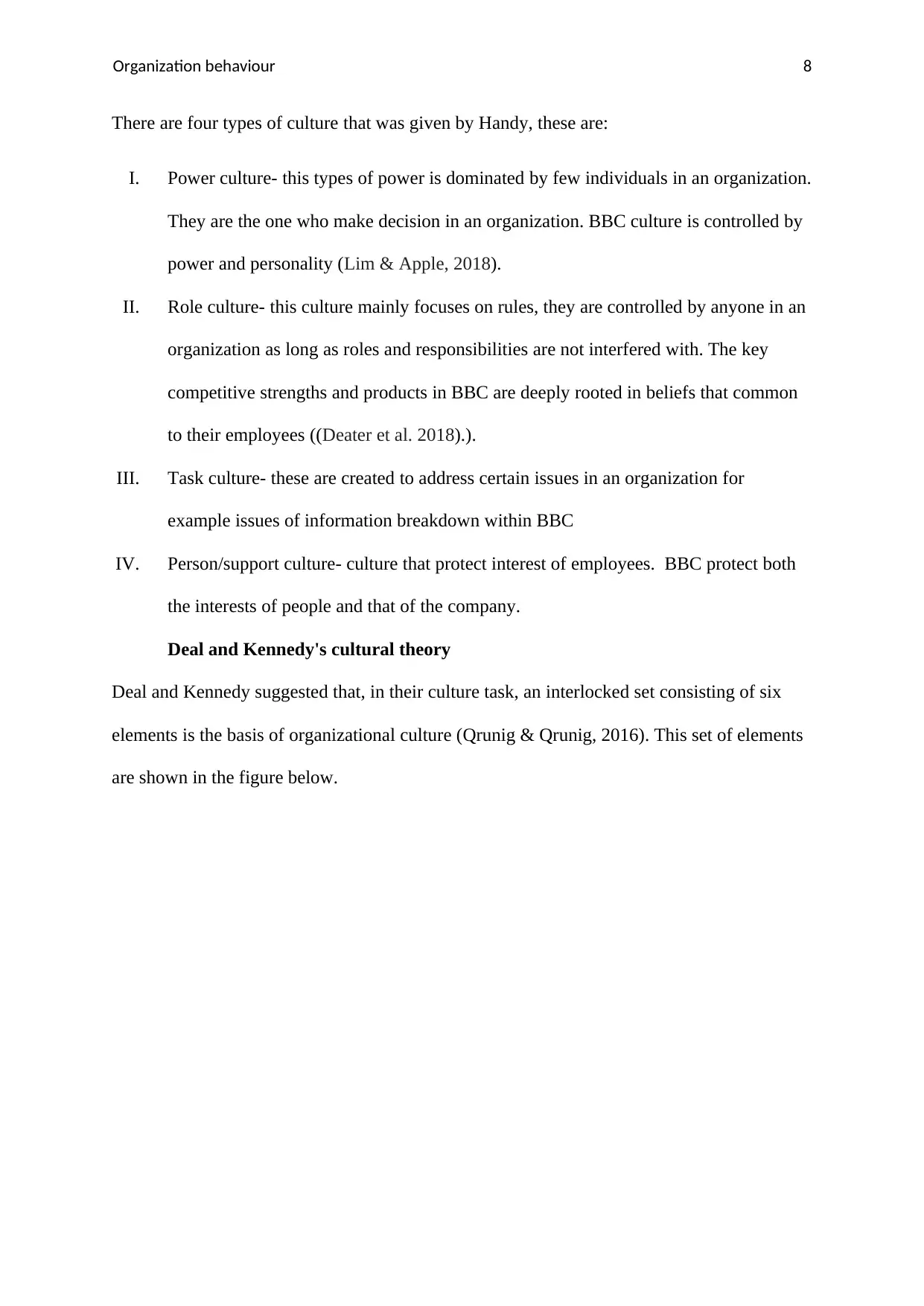
Organization behaviour 8
There are four types of culture that was given by Handy, these are:
I. Power culture- this types of power is dominated by few individuals in an organization.
They are the one who make decision in an organization. BBC culture is controlled by
power and personality (Lim & Apple, 2018).
II. Role culture- this culture mainly focuses on rules, they are controlled by anyone in an
organization as long as roles and responsibilities are not interfered with. The key
competitive strengths and products in BBC are deeply rooted in beliefs that common
to their employees ((Deater et al. 2018).).
III. Task culture- these are created to address certain issues in an organization for
example issues of information breakdown within BBC
IV. Person/support culture- culture that protect interest of employees. BBC protect both
the interests of people and that of the company.
Deal and Kennedy's cultural theory
Deal and Kennedy suggested that, in their culture task, an interlocked set consisting of six
elements is the basis of organizational culture (Qrunig & Qrunig, 2016). This set of elements
are shown in the figure below.
There are four types of culture that was given by Handy, these are:
I. Power culture- this types of power is dominated by few individuals in an organization.
They are the one who make decision in an organization. BBC culture is controlled by
power and personality (Lim & Apple, 2018).
II. Role culture- this culture mainly focuses on rules, they are controlled by anyone in an
organization as long as roles and responsibilities are not interfered with. The key
competitive strengths and products in BBC are deeply rooted in beliefs that common
to their employees ((Deater et al. 2018).).
III. Task culture- these are created to address certain issues in an organization for
example issues of information breakdown within BBC
IV. Person/support culture- culture that protect interest of employees. BBC protect both
the interests of people and that of the company.
Deal and Kennedy's cultural theory
Deal and Kennedy suggested that, in their culture task, an interlocked set consisting of six
elements is the basis of organizational culture (Qrunig & Qrunig, 2016). This set of elements
are shown in the figure below.
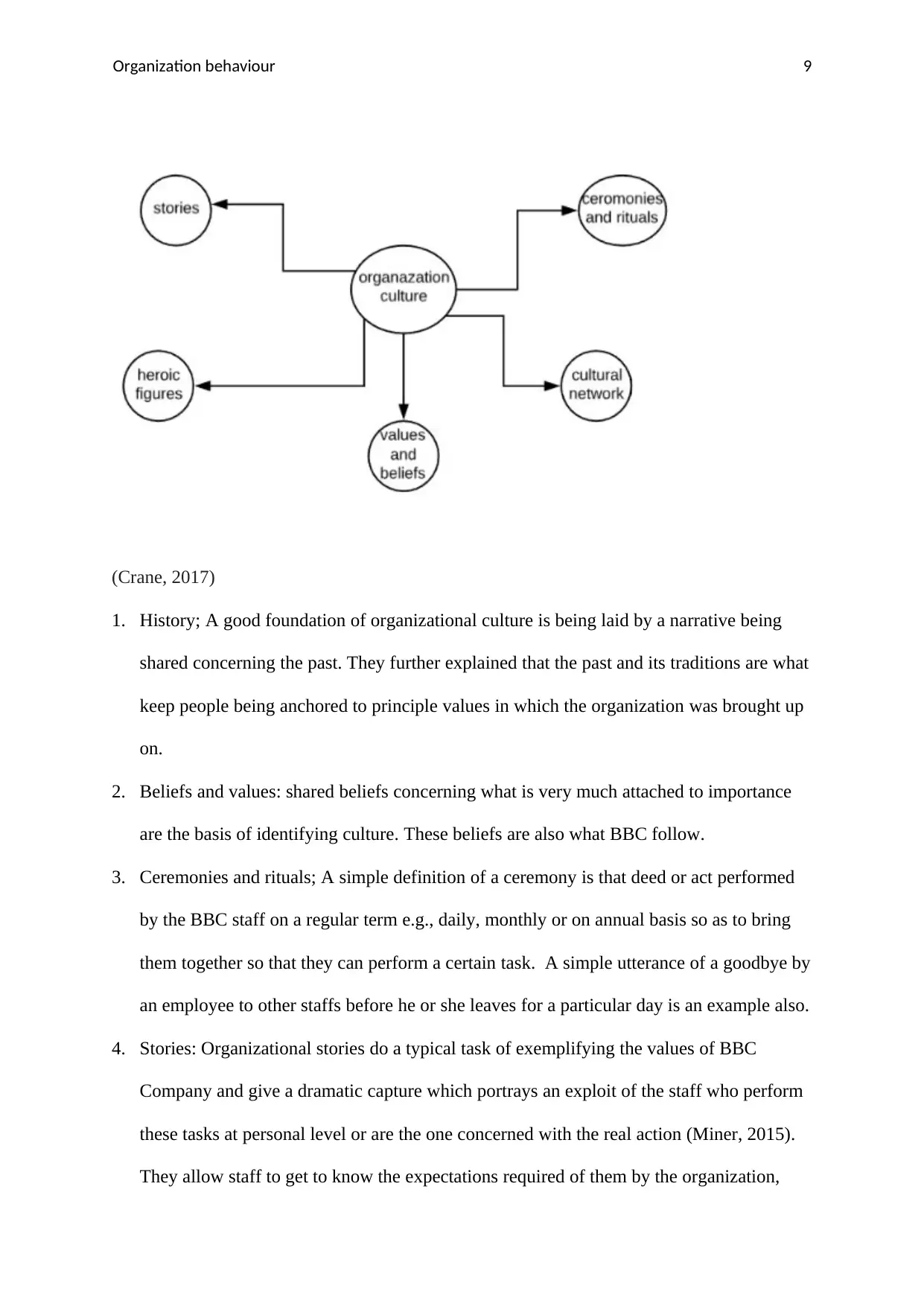
Organization behaviour 9
(Crane, 2017)
1. History; A good foundation of organizational culture is being laid by a narrative being
shared concerning the past. They further explained that the past and its traditions are what
keep people being anchored to principle values in which the organization was brought up
on.
2. Beliefs and values: shared beliefs concerning what is very much attached to importance
are the basis of identifying culture. These beliefs are also what BBC follow.
3. Ceremonies and rituals; A simple definition of a ceremony is that deed or act performed
by the BBC staff on a regular term e.g., daily, monthly or on annual basis so as to bring
them together so that they can perform a certain task. A simple utterance of a goodbye by
an employee to other staffs before he or she leaves for a particular day is an example also.
4. Stories: Organizational stories do a typical task of exemplifying the values of BBC
Company and give a dramatic capture which portrays an exploit of the staff who perform
these tasks at personal level or are the one concerned with the real action (Miner, 2015).
They allow staff to get to know the expectations required of them by the organization,
(Crane, 2017)
1. History; A good foundation of organizational culture is being laid by a narrative being
shared concerning the past. They further explained that the past and its traditions are what
keep people being anchored to principle values in which the organization was brought up
on.
2. Beliefs and values: shared beliefs concerning what is very much attached to importance
are the basis of identifying culture. These beliefs are also what BBC follow.
3. Ceremonies and rituals; A simple definition of a ceremony is that deed or act performed
by the BBC staff on a regular term e.g., daily, monthly or on annual basis so as to bring
them together so that they can perform a certain task. A simple utterance of a goodbye by
an employee to other staffs before he or she leaves for a particular day is an example also.
4. Stories: Organizational stories do a typical task of exemplifying the values of BBC
Company and give a dramatic capture which portrays an exploit of the staff who perform
these tasks at personal level or are the one concerned with the real action (Miner, 2015).
They allow staff to get to know the expectations required of them by the organization,
⊘ This is a preview!⊘
Do you want full access?
Subscribe today to unlock all pages.

Trusted by 1+ million students worldwide
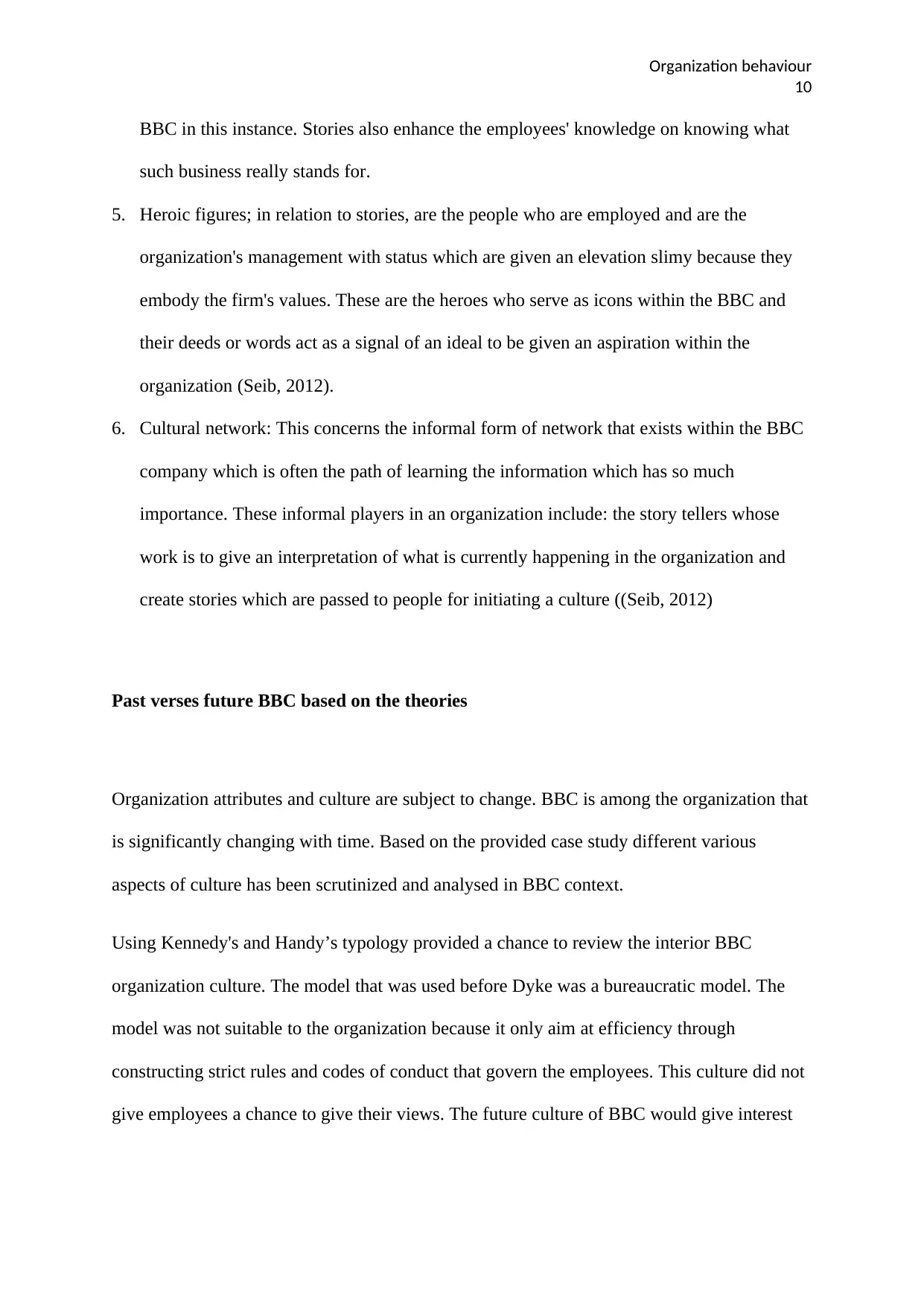
Organization behaviour
10
BBC in this instance. Stories also enhance the employees' knowledge on knowing what
such business really stands for.
5. Heroic figures; in relation to stories, are the people who are employed and are the
organization's management with status which are given an elevation slimy because they
embody the firm's values. These are the heroes who serve as icons within the BBC and
their deeds or words act as a signal of an ideal to be given an aspiration within the
organization (Seib, 2012).
6. Cultural network: This concerns the informal form of network that exists within the BBC
company which is often the path of learning the information which has so much
importance. These informal players in an organization include: the story tellers whose
work is to give an interpretation of what is currently happening in the organization and
create stories which are passed to people for initiating a culture ((Seib, 2012)
Past verses future BBC based on the theories
Organization attributes and culture are subject to change. BBC is among the organization that
is significantly changing with time. Based on the provided case study different various
aspects of culture has been scrutinized and analysed in BBC context.
Using Kennedy's and Handy’s typology provided a chance to review the interior BBC
organization culture. The model that was used before Dyke was a bureaucratic model. The
model was not suitable to the organization because it only aim at efficiency through
constructing strict rules and codes of conduct that govern the employees. This culture did not
give employees a chance to give their views. The future culture of BBC would give interest
10
BBC in this instance. Stories also enhance the employees' knowledge on knowing what
such business really stands for.
5. Heroic figures; in relation to stories, are the people who are employed and are the
organization's management with status which are given an elevation slimy because they
embody the firm's values. These are the heroes who serve as icons within the BBC and
their deeds or words act as a signal of an ideal to be given an aspiration within the
organization (Seib, 2012).
6. Cultural network: This concerns the informal form of network that exists within the BBC
company which is often the path of learning the information which has so much
importance. These informal players in an organization include: the story tellers whose
work is to give an interpretation of what is currently happening in the organization and
create stories which are passed to people for initiating a culture ((Seib, 2012)
Past verses future BBC based on the theories
Organization attributes and culture are subject to change. BBC is among the organization that
is significantly changing with time. Based on the provided case study different various
aspects of culture has been scrutinized and analysed in BBC context.
Using Kennedy's and Handy’s typology provided a chance to review the interior BBC
organization culture. The model that was used before Dyke was a bureaucratic model. The
model was not suitable to the organization because it only aim at efficiency through
constructing strict rules and codes of conduct that govern the employees. This culture did not
give employees a chance to give their views. The future culture of BBC would give interest
Paraphrase This Document
Need a fresh take? Get an instant paraphrase of this document with our AI Paraphraser
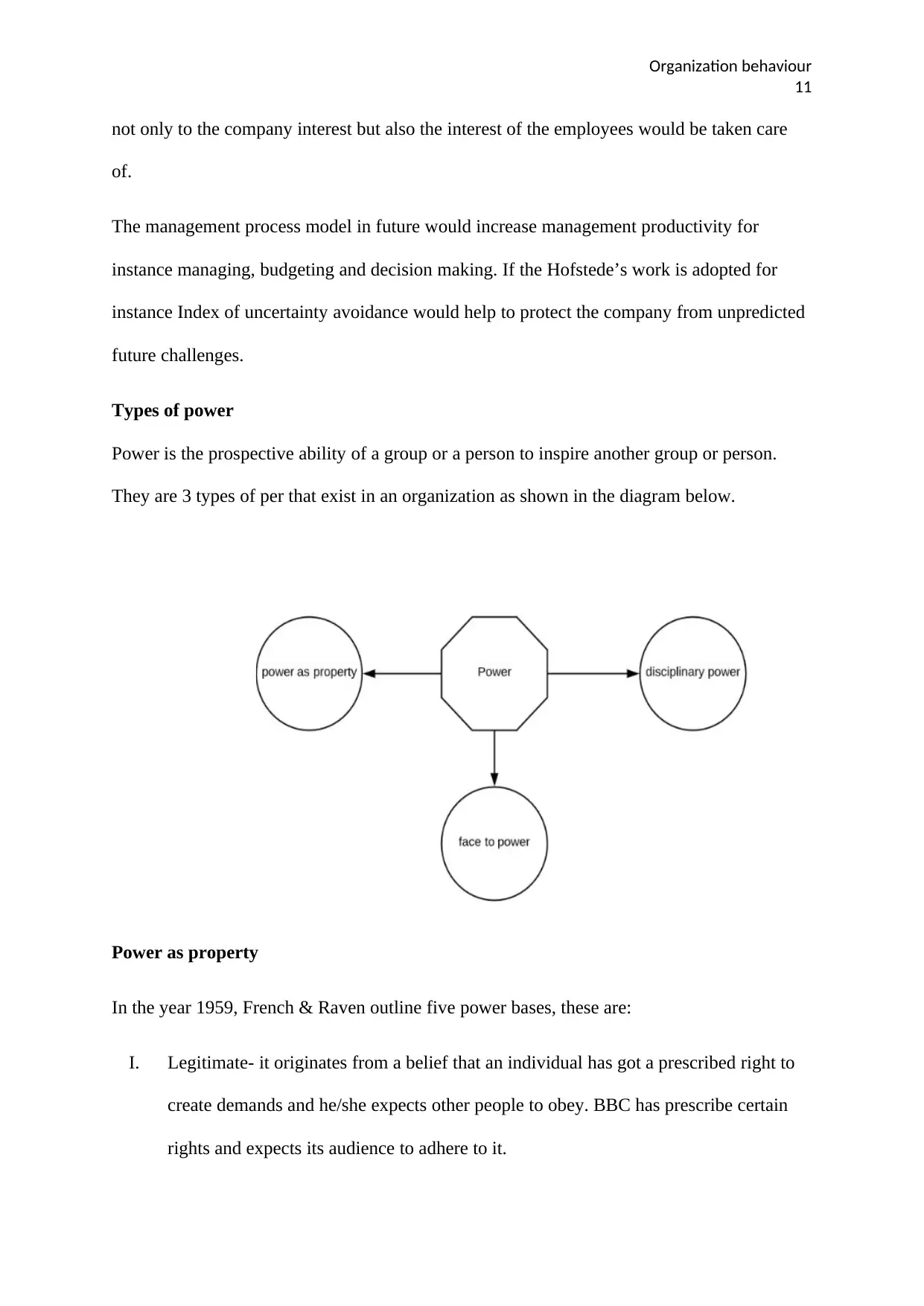
Organization behaviour
11
not only to the company interest but also the interest of the employees would be taken care
of.
The management process model in future would increase management productivity for
instance managing, budgeting and decision making. If the Hofstede’s work is adopted for
instance Index of uncertainty avoidance would help to protect the company from unpredicted
future challenges.
Types of power
Power is the prospective ability of a group or a person to inspire another group or person.
They are 3 types of per that exist in an organization as shown in the diagram below.
Power as property
In the year 1959, French & Raven outline five power bases, these are:
I. Legitimate- it originates from a belief that an individual has got a prescribed right to
create demands and he/she expects other people to obey. BBC has prescribe certain
rights and expects its audience to adhere to it.
11
not only to the company interest but also the interest of the employees would be taken care
of.
The management process model in future would increase management productivity for
instance managing, budgeting and decision making. If the Hofstede’s work is adopted for
instance Index of uncertainty avoidance would help to protect the company from unpredicted
future challenges.
Types of power
Power is the prospective ability of a group or a person to inspire another group or person.
They are 3 types of per that exist in an organization as shown in the diagram below.
Power as property
In the year 1959, French & Raven outline five power bases, these are:
I. Legitimate- it originates from a belief that an individual has got a prescribed right to
create demands and he/she expects other people to obey. BBC has prescribe certain
rights and expects its audience to adhere to it.
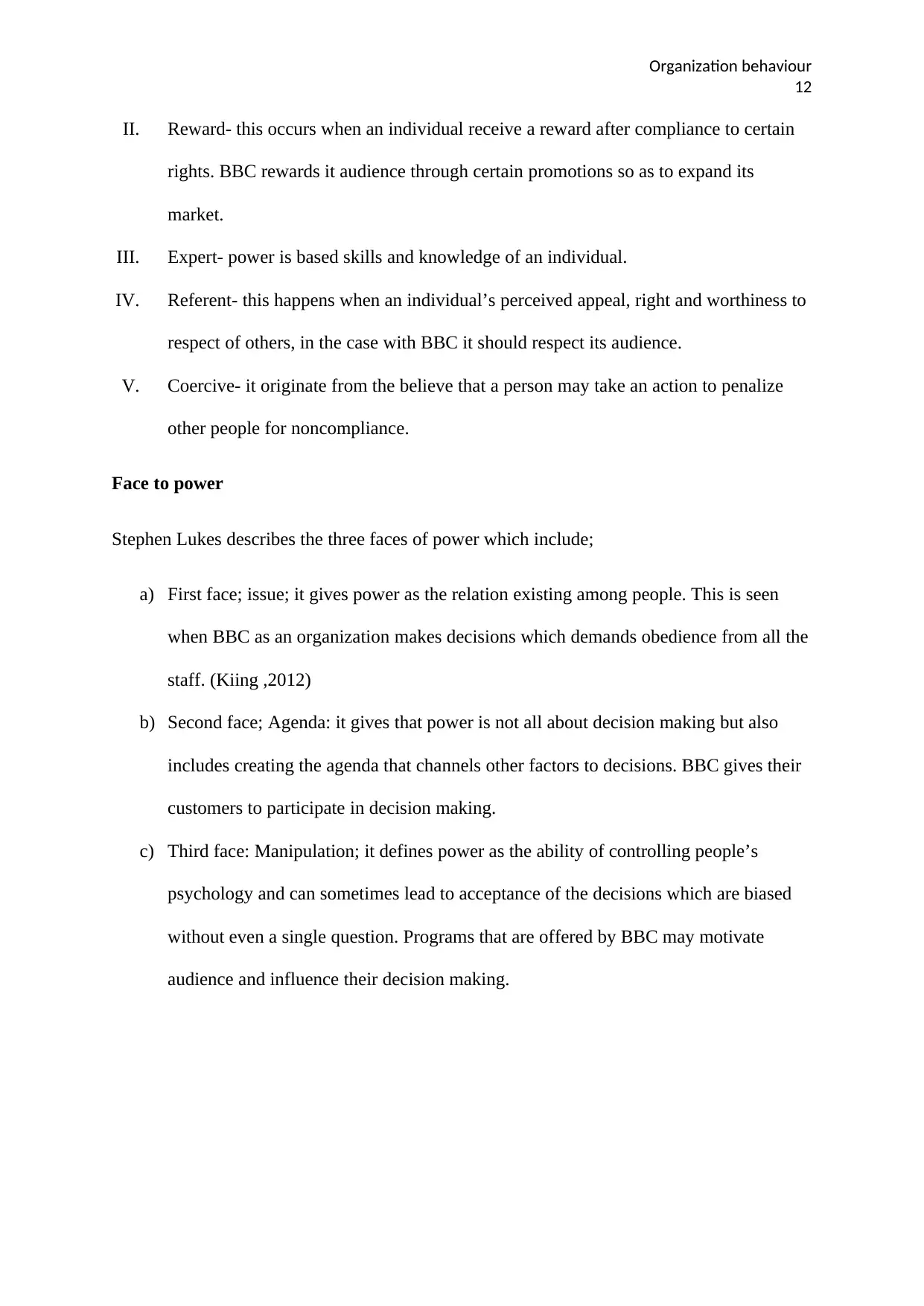
Organization behaviour
12
II. Reward- this occurs when an individual receive a reward after compliance to certain
rights. BBC rewards it audience through certain promotions so as to expand its
market.
III. Expert- power is based skills and knowledge of an individual.
IV. Referent- this happens when an individual’s perceived appeal, right and worthiness to
respect of others, in the case with BBC it should respect its audience.
V. Coercive- it originate from the believe that a person may take an action to penalize
other people for noncompliance.
Face to power
Stephen Lukes describes the three faces of power which include;
a) First face; issue; it gives power as the relation existing among people. This is seen
when BBC as an organization makes decisions which demands obedience from all the
staff. (Kiing ,2012)
b) Second face; Agenda: it gives that power is not all about decision making but also
includes creating the agenda that channels other factors to decisions. BBC gives their
customers to participate in decision making.
c) Third face: Manipulation; it defines power as the ability of controlling people’s
psychology and can sometimes lead to acceptance of the decisions which are biased
without even a single question. Programs that are offered by BBC may motivate
audience and influence their decision making.
12
II. Reward- this occurs when an individual receive a reward after compliance to certain
rights. BBC rewards it audience through certain promotions so as to expand its
market.
III. Expert- power is based skills and knowledge of an individual.
IV. Referent- this happens when an individual’s perceived appeal, right and worthiness to
respect of others, in the case with BBC it should respect its audience.
V. Coercive- it originate from the believe that a person may take an action to penalize
other people for noncompliance.
Face to power
Stephen Lukes describes the three faces of power which include;
a) First face; issue; it gives power as the relation existing among people. This is seen
when BBC as an organization makes decisions which demands obedience from all the
staff. (Kiing ,2012)
b) Second face; Agenda: it gives that power is not all about decision making but also
includes creating the agenda that channels other factors to decisions. BBC gives their
customers to participate in decision making.
c) Third face: Manipulation; it defines power as the ability of controlling people’s
psychology and can sometimes lead to acceptance of the decisions which are biased
without even a single question. Programs that are offered by BBC may motivate
audience and influence their decision making.
⊘ This is a preview!⊘
Do you want full access?
Subscribe today to unlock all pages.

Trusted by 1+ million students worldwide
1 out of 39
Related Documents
Your All-in-One AI-Powered Toolkit for Academic Success.
+13062052269
info@desklib.com
Available 24*7 on WhatsApp / Email
![[object Object]](/_next/static/media/star-bottom.7253800d.svg)
Unlock your academic potential
Copyright © 2020–2026 A2Z Services. All Rights Reserved. Developed and managed by ZUCOL.





